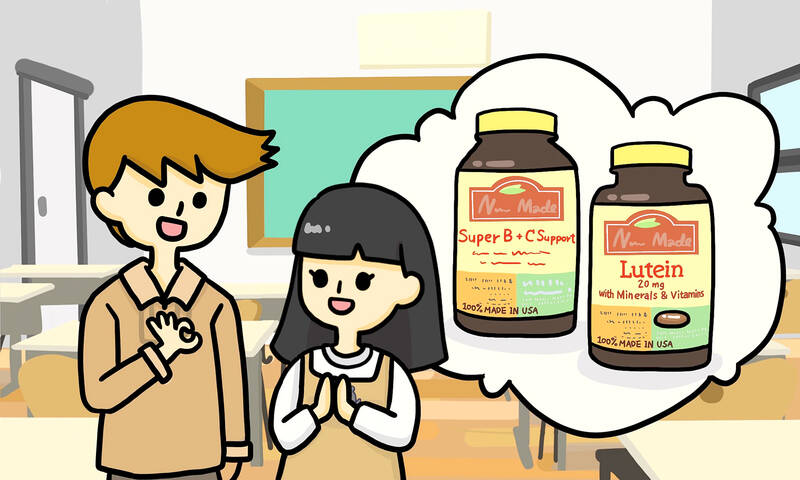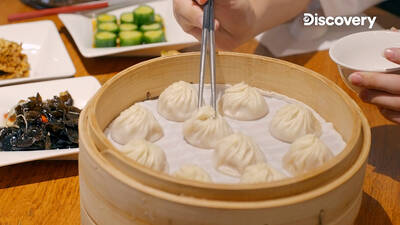對話 Dialogue
小實:馬克,你下個月回美國可以幫我買些東西嗎?
Xiǎoshí: Mǎkè, nǐ xià ge yuè huí Měiguó kěyǐ bāng wǒ mǎixiē dōngxi ma?

馬克:可以啊!你要買「維他命」嗎?
Mǎkè: Kěyǐ a! Nǐ yāomǎi “wéitāmìng” ma?
小實:哈哈,是啊!你怎麼知道我要買維生素?
Xiǎoshí: Haha, shì a! Nǐ zěnme zhīdào wǒ yào mǎi wéishēngsù?
馬克:現在大家很重視健康,所以我常常幫朋友買。
Mǎkè: Xiànzài dàjiā hěn zhòngshì jiànkāng, suǒyǐ wǒ chángcháng bāng péngyǒu mǎi
小實:嗯!在臺灣買這些保健食品都比較貴。
Xiǎoshí: En! Zài Táiwān mǎi zhèxiē bǎojiàn shípǐn dōu bǐjiào guì.
馬克:你只要買維他命嗎?葉黃素要不要?
Mǎkè: Nǐ zhǐyào mǎi wéitāmìng ma? Yèhuángsù yào bùyào?
小實:要要要!現在常常看3C螢幕,一定要保護眼睛。
Xiǎoshí: Yào yào yào! Xiànzài chángcháng kàn 3C yíngmù, yídìng yào bǎohù yǎnjīng.
馬克:不過,這些東西還是比不上真正的食物。
Mǎkè: Búguò, zhèxiē dōngxi háishì bǐ bú shàng zhēnzhèng de shíwù.
小實:平常吃得不夠營養,就只好吃保健食品了!
Xiǎoshí: Píngcháng chī de búgòu yíngyǎng, jiù zhǐhǎo chī bǎojiàn shípǐn le!
翻譯 Translation
Xiaoshi: Mark, can you buy something for me when you return to the United States next month?
Mark: Sure! Do you want to buy “vitamins”?
Xiaoshi: Haha, yes! How did you know I want to buy vitamins?
Mark: Nowadays, everyone pays great attention to health, so I often buy them for my friends.
Xiaoshi: Xiaoshi: Yes! These dietary supplements are relatively expensive in Taiwan.
Mark: Mark: Do you want to buy vitamins only? Do you need lutein as well?
Xiaoshi: Absolutely! We spend too much time staring at screens, so it’s important to protect our eyes.
Mark: Still, it’s not as good as real food.
Xiaoshi: I don’t get enough nutrients from food, so I have to take dietary supplements instead!
單字片語 Vocabulary
1. 維他命(wéitāmìng) vitamin (transliteration)
2. 重視 (zhòngshì) to pay attention to, to value
3. 維生素 (wéishēngsù) vitamin
4. 保健食品 (bǎojiàn shípǐn) health supplements, dietary supplements
5. 葉黃素 (yèhuángsù) lutein
6. 螢幕(yíngmù) screen
7. 保護(bǎohù) to protect
8. 比不上(bǐ bú shàng) not as good as
9. 營養(yíngyǎng) nutritious; nutrition
10. 只好(zhǐhǎo) have no choice but to
教材音檔 Audio Files
教材影片 Video Files:
https://www.instagram.com/celc.nou_tw/guide/_/17999106352646292/
實踐大學華語中心提供
By Shih Chien University Chinese Language Center: https://chineseusc.com/

US President Donald Trump has renewed his ambition to take control of Greenland for national security reasons and questioned whether Denmark has any legal right to the Arctic island. The debate has revived scrutiny of how Greenland became part of Denmark, its current self-rule and path to independence, and Washington’s military footprint. HOW DID DENMARK GET GREENLAND? Greenland was inhabited by Inuit peoples from Asia and North America intermittently from around 2,500 BC. Around 985 AD, Vikings led by Erik the Red settled in southern Greenland, farming and building churches. Around the same time, ancestors of today’s Inuit arrived, living as hunters

Owls have long fascinated people with their distinctive appearance and mysterious habits. These nocturnal birds possess large, round eyes and a flat facial disc. Their feathers come in shades of brown, gray, or white, helping them blend easily into the darkness. The most remarkable trait of owls is that they can turn their heads without damaging blood vessels. Contrary to popular belief, they can only rotate their heads up to 270 degrees, not 360 degrees. Owls have 14 cervical vertebrae, which is twice as many as humans. This special physical structure compensates for their inability to move their eyes within their

AI-generated summaries are shaking up the media world. Tools like Google’s AI Overviews now provide users with direct answers above the search results, resulting in fewer people clicking on news links. For publishers who rely on that traffic to generate advertising revenue, this shift is hitting hard. The fallout is measurable. Many sites have seen a sharp drop in traffic since AI summary features rolled out. An analysis revealed that a news outlet that had once ranked first on Google lost up to 79% of its traffic when its link appeared beneath an AI-generated summary. Statistics also show that

A: Bloomberg just released its annual travel guide, titled “25 Best Places to Travel in 2026.” What were the best Asian destinations? B: There were actually six Asian hotspots: Taiwan’s Taipei, Malaysia’s Penang, Kazakhstan’s Almaty, Indonesia’s Rote Island, India’s Tiger Reserves, and Oman. A: With its mix of traditional food and modern cuisine, Taipei has become a rising food capital in Asia. B: As Bloomberg reported, “Taiwan is a place that bubbles up in culinary conversation because of its famed beverage, bubble tea, and its early adoption of modern night markets.” A: And Din Tai Fung has now